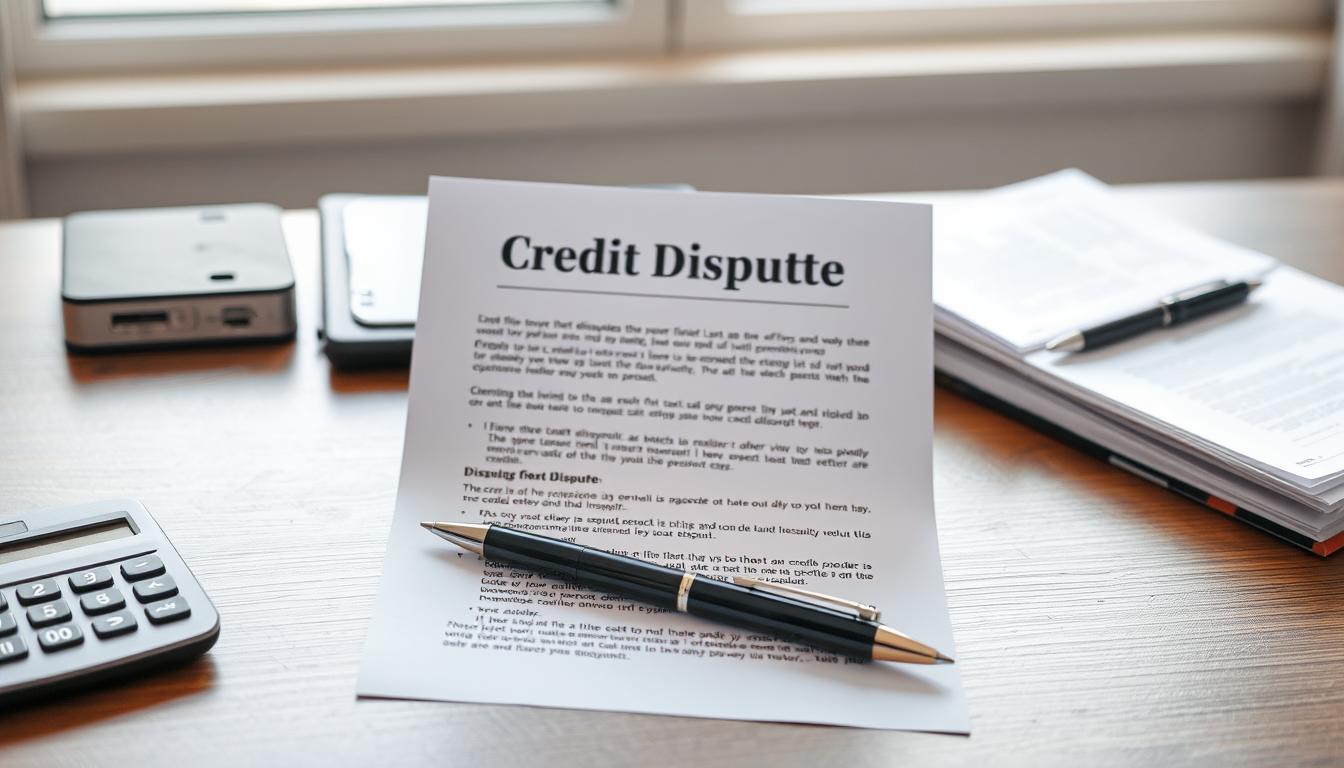Is your credit score suffering from credit report disputes? This guide will help you remove disputes and improve your financial health. You’ll learn strategies to fix credit report errors and boost your credit score.
Discover your rights under the Fair Credit Reporting Act (FCRA). Get expert advice on resolving credit disputes. Learn about common credit report mistakes and how to submit disputes effectively.
This guide empowers you to handle credit report errors and debt validation issues. You’ll gain the tools to take control of your credit and reach your financial goals.
Key Takeaways
- Identify and understand the common reasons for credit report disputes.
- Obtain your free credit reports and thoroughly review them for any errors or inaccuracies.
- Learn how to effectively dispute credit report errors and inaccuracies with the credit bureaus.
- Discover your rights under the Fair Credit Reporting Act (FCRA) and how to leverage them.
- Explore strategies for removing disputes from your credit report and improving your credit score.
Understanding Credit Report Disputes
An accurate credit report is vital for your financial health. Errors or fraud can appear on your credit report. It’s important to know how to dispute these issues.
Disputing inaccuracies ensures your credit history reflects your true financial activities. This process is key to maintaining a good credit score.
What is a Credit Report Dispute?
A credit report dispute is a formal process. You notify credit bureaus about errors in your report. The bureaus then investigate and correct your credit file.
Common Reasons for Credit Report Disputes
There are several reasons why you might need to dispute your credit report. These include incorrect account information and fraudulent accounts.
Other reasons are wrong personal details, identity theft issues, and errors in public records. Knowing these reasons helps you spot and fix problems.
- Incorrect account information, such as payment history, balance, or credit limit
- Fraudulent or unauthorized accounts opened in your name
- Incorrect personal information, such as name, address, or Social Security number
- Identity theft issues, where unauthorized accounts or activities appear on your report
- Errors in public records, such as tax liens or bankruptcies
Identifying these issues is crucial for your financial health. By addressing them, you can improve your credit score. This helps maintain your overall financial well-being.
Preparing to Dispute Credit Report Errors
Thorough preparation is key to a successful credit report dispute. Gather all necessary information and documents to support your case effectively.
Obtain Your Credit Reports
Request free annual credit reports from Experian, Equifax, and TransUnion. Review your credit history in detail from each of these major credit bureaus.
Identify Potential Errors
- Carefully review each section of your credit reports, looking for any inaccurate, incomplete, or outdated information.
- Common errors to watch for include incorrect personal information, incorrect account details, and erroneous payment histories.
- Highlight or make notes of any discrepancies you find, as this will be crucial evidence for your credit report dispute.
Gather Supporting Documentation
Collect relevant documents that support your claim of credit report errors. These may include:
- Copies of your past billing statements, payment receipts, or other financial records
- Correspondence with creditors or the credit bureaus regarding the disputed information
- Proof of your identity, such as a driver’s license or birth certificate
These documents will strengthen your dispute and increase the chances of a successful resolution. Having them ready will help you navigate the process smoothly.

Proper preparation sets you up for success in resolving credit report errors. It enables you to present a strong case and work towards a fair resolution.
Obtaining Your Free Credit Reports
Checking your credit reports is key to financial health. U.S. consumers can get free annual reports from Experian, Equifax, and TransUnion. These reports help ensure your credit info is accurate.
How to Request Your Annual Free Credit Reports
Getting your free yearly credit reports is easy. You can use AnnualCreditReport.com, the official site made by the three major credit bureaus. This site provides free annual credit reports.
Here’s how to get your free credit reports:
- Visit AnnualCreditReport.com or call 1-877-322-8228.
- Provide your personal info to verify your identity.
- Choose which credit reports you want to access credit reports from.
- Review your reports carefully to check credit report accuracy.
You can get one free report from each bureau yearly. Make sure to check credit report accuracy often for a healthy credit profile.
“Regular credit report checks are vital for good finances. They help you spot and fix errors that could hurt your credit score.”
Identifying Errors on Your Credit Report
Accurate credit reports are vital for a healthy credit score. They also help secure better financial opportunities. Regular reviews can help you spot and fix common credit report mistakes.
These errors can impact your credit profile. By addressing them promptly, you can maintain a strong financial standing.
Spotting Common Credit Report Errors
As you review your credit report accuracy, watch for these error types:
- Incorrect personal information, such as misspelled names, incorrect addresses, or erroneous dates of birth
- Accounts that don’t belong to you, including accounts opened by identity thieves
- Inaccurate account status, such as accounts reported as delinquent when they were paid on time
- Duplicate accounts or tradelines, where the same account is reported multiple times
- Incorrect credit limits or balances on your accounts
- Accounts that should have been removed due to the statute of limitations or a successful dispute of credit report errors
Carefully identifying credit report errors is crucial. It allows you to take steps to fix them.
This ensures your credit report accurately shows your financial history. Correcting these errors can improve your overall credit profile.

“Regularly reviewing your credit report is essential for maintaining a healthy credit profile and identifying any potential credit report mistakes.”
How to Remove Dispute From Credit Report
Fixing credit report errors is vital for a good credit score. Spotting mistakes on your report? Learn how to remove disputes and fix your credit file.
Start by finding the exact error on your report. This could be wrong account info or false negative items. Once you know the issue, you can start fixing it.
Identify the specific error or inaccuracy in your credit report. Then, follow these steps to resolve the dispute.
- Obtain copies of your credit reports from all three major credit bureaus: Equifax, Experian, and TransUnion.
- Carefully review each report and make note of any discrepancies or errors.
- Gather any supporting documentation that can help substantiate your claim, such as payment records, account statements, or identification documents.
- Prepare a formal dispute letter, outlining the specific issues and providing the necessary evidence to support your claim.
- Submit your dispute to the appropriate credit bureau(s) and follow up regularly to ensure the issue is being addressed.
Credit bureaus must look into valid disputes within 30 days. If the dispute is found to be valid, the bureaus must remove the inaccurate information from your credit report, effectively resolving the dispute.
“Removing disputes from your credit report can have a significant impact on your overall creditworthiness, making it easier to secure favorable loan terms, credit card approvals, and even employment opportunities.”
Fixing credit report disputes helps you control your financial future. It ensures your report shows your true credit history. This process takes time, but a clean report is worth it.
Be thorough, organized, and persistent when removing disputes. With the right approach, you can fix your credit report and keep your finances healthy.
Drafting a Dispute Letter
An effective dispute letter is vital for removing credit report errors. It communicates inaccuracies and requests their investigation and correction. A well-structured approach increases the chances of a successful outcome.
Your letter serves as the foundation for addressing credit report issues. It’s essential to create a comprehensive and clear document. This will help you effectively challenge any inaccuracies in your report.
Essential Elements of a Dispute Letter
When drafting a credit report dispute letter, include these key elements:
- Personal Information: Start with your full name, current address, and last four Social Security number digits. This helps identify you as the person disputing the credit report information.
- Specific Errors: Clearly list the items you’re disputing. Include account numbers, creditor names, and detailed descriptions of each error.
- Supporting Documentation: Attach copies of relevant documents. These may include payment receipts, billing statements, or creditor correspondence.
- Requested Action: State the action you want the credit bureau to take. This could be investigating disputed items or removing them from your report.
- Contact Information: Provide your current phone number and email address. This allows the credit bureau to reach you easily for updates or questions.
Use this format to create a credit dispute letter template. It can be adapted for multiple credit report errors.
Remember to be clear and concise. Provide strong evidence to support your claims. This approach will strengthen your dispute and increase your chances of success.
| Element | Description |
|---|---|
| Personal Information | Full name, current address, and last four digits of Social Security number |
| Specific Errors | Detailed description of the errors on the credit report, including account numbers and creditor names |
| Supporting Documentation | Copies of relevant documents to support the dispute |
| Requested Action | The specific action you would like the credit bureau to take, such as investigating and removing the disputed items |
| Contact Information | Your current phone number and email address |

“A well-crafted credit dispute letter template can make all the difference in successfully removing errors from your credit report.”
Gathering Supporting Documentation
Providing relevant supporting documentation is crucial when disputing credit report inaccuracies. These documents can prove your claims and boost dispute resolution success. Let’s look at the evidence you need for your credit report dispute.
Key Documents to Gather
- Copies of your credit reports from all three major credit bureaus (Equifax, Experian, and TransUnion)
- Copies of any contracts, statements, or receipts related to the disputed item
- Proof of identity, such as a driver’s license or passport
- Copies of any correspondence with creditors or collection agencies regarding the disputed item
- Proof of payment or resolution, such as cancelled checks or payment receipts
These supporting documents can prove inaccuracies or missing information on your credit report. They strengthen your case and improve your chances of success.
By gathering this credit report dispute documentation, you’ll have solid evidence to back your claims. This can lead to a more favorable outcome in your dispute.
| Document Type | Relevance to Credit Report Dispute |
|---|---|
| Credit Reports | Identify the specific errors or inaccuracies you are disputing |
| Contracts and Statements | Prove the accurate information about the disputed item |
| Proof of Identity | Establish your identity and ownership of the credit report |
| Correspondence with Creditors | Document any attempts to resolve the dispute directly with the creditor |
| Proof of Payment | Demonstrate that the disputed item has been resolved or paid off |
Careful gathering evidence for credit report dispute can make your case stronger. It increases your chances of removing disputed items from your credit report.
Submitting Your Dispute to Credit Bureaus
Credit bureau disputes can be tricky. But with the right approach, you can fix errors on your credit report. Follow proper procedures to ensure your case is handled efficiently.
Tips for Effective Dispute Submission
To boost your chances of a successful dispute, consider these tips:
- Choose the right channel: Submit your dispute online, by mail, or over the phone. Research each option to find the most convenient and secure method for you.
- Provide complete and accurate information: Include all relevant details in your dispute. This means your personal info, specific disputed items, and supporting documents. Incomplete submissions may delay the process.
- Follow up diligently: Don’t assume your dispute is resolved after submission. Track the credit bureau’s response and be ready to follow up if needed.
- Utilize the credit bureau’s dispute process: Learn the bureau’s guidelines, including deadlines and requirements. Following these can improve your chances of success.
These tips can help you navigate the dispute process with confidence. They can also increase your chances of removing inaccuracies from your credit report.
| Dispute Channel | Advantages | Disadvantages |
|---|---|---|
| Online |
|
|
| By Mail |
|
|
| By Phone |
|
|
The key to an effective dispute is diligence and attention to detail. Stay proactive throughout the process. This approach can help you successfully remove inaccuracies from your credit report.

Following Up on Your Credit Report Dispute
After filing your credit report dispute, stay proactive and monitor its progress. The resolution timeline can vary. Understanding the process ensures your issue gets addressed promptly.
Monitoring the Dispute Resolution Timeline
Credit bureaus must investigate and respond within 30 to 45 days. Keep track of your submission date and the bureaus contacted.
Check your credit reports regularly for updates. Follow up if you don’t hear back within the expected timeframe.
Checking the Status of Your Dispute
To monitor your dispute status, contact the credit bureaus directly. Review your credit report for changes to the disputed item.
You can also request a free credit report. This will help confirm that your dispute has been resolved.
Stay vigilant and follow up on your dispute. This ensures errors are addressed quickly. Your credit profile will remain accurate and current.
“Staying on top of your credit report dispute is crucial to protecting your financial well-being. Don’t let errors linger on your credit profile – take action and follow up until the issue is resolved.”
Understanding Your Rights Under the FCRA
The Fair Credit Reporting Act (FCRA) safeguards your credit report accuracy and privacy. It empowers you to protect your credit information. Knowing the FCRA’s key provisions helps you confidently navigate credit report disputes.
Key Provisions of the Fair Credit Reporting Act
The FCRA sets rules to protect your credit profile’s integrity. It provides several important consumer rights.
You can access free credit reports yearly from Experian, Equifax, and TransUnion. You may dispute inaccurate or unverifiable information and request corrections or removals.
The FCRA protects against unauthorized use of your credit information. It limits negative information on reports, with most items removed after 7-10 years.
- The right to access your credit reports from the three major credit bureaus (Experian, Equifax, and TransUnion) for free, once per year.
- The ability to dispute inaccurate, incomplete, or unverifiable information on your credit reports, and have these items corrected or removed.
- Protections against the use of your credit information for unauthorized purposes, such as employment decisions or insurance underwriting.
- Limitations on the negative information that can be included on your credit reports, with most derogatory items falling off after 7-10 years.
- The requirement for credit bureaus to investigate and respond to your disputes within a specified time frame, typically 30-45 days.
Understanding these rights helps you maintain an accurate credit profile. You can ensure it correctly reflects your financial history and creditworthiness.
“The Fair Credit Reporting Act is a critical piece of legislation that safeguards the rights of consumers when it comes to their credit information. Knowing your FCRA rights empowers you to take control of your credit and dispute any errors or inaccuracies.”
The FCRA protects you, the consumer. Know these key provisions to leverage your rights. Ensure your credit report accurately represents your financial history. This can lead to greater financial success.
Seeking Professional Assistance
Feeling overwhelmed by credit report disputes? A professional credit repair service can help. These experts navigate complex credit reporting issues and dispute resolution processes. They can help you achieve the best possible outcome.
When hiring a credit repair expert, choose a reputable provider. Check their credentials and customer reviews. Ensure they comply with the Fair Credit Reporting Act (FCRA). A reliable service can help identify errors and draft effective dispute letters.
Professional credit repair specialists take the stress out of the dispute process. They offer personalized support and expertise. With their help, you can confidently improve your credit health and achieve financial goals.

